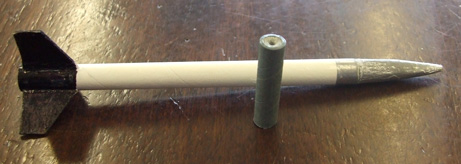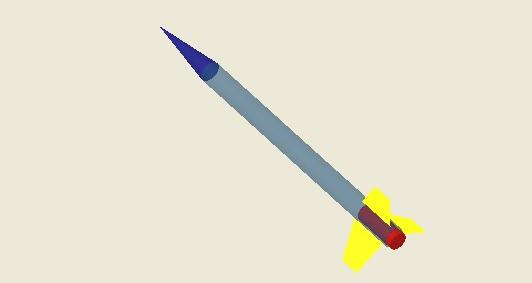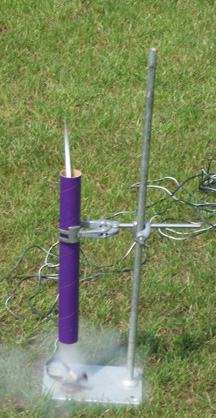Scratch Skylark Original Design / Scratch Built
Scratch - Skylark {Scratch}
Contributed by Matt Gillard
| Manufacturer: | Scratch |
 Brief:
Brief:
A downscale of a British Skylark sounding rocket, designed on SpaceCad version three. A very high flyer as it’s
a minimum diameter MMX motor rocket. Built for the EMRR 2008 challenge.
Construction:
Parts used were:
- Handmade balsa cone
- Polymorph nose cone
- Body tubes BT 2.5
- Three cardboard fins
- Kevlar® thread.
- Map pin
- CA gel glue
- White glue
- Model knife
- Enamel paint
- Black marker pen
SpaceCAD is very easy to use, although I have never used Rocksim to compare it against. I have SpaceCad version three. Entering the data is quick and not at all difficult. Within 10 minutes the design was complete, luckily enough it was stable.

The nose cone was sanded out of a balsa dowel. The fins cut out from the cardboard back of a reporter’s notepad. The body tube was from a Fliskit rocket. The rocket was built in under an hour. With the mass being so low, I went for break apart or nose blow recovery.
There were no reliable images of the Skylark that gave any markings. To make things harder, the Skylark seems to change its look a few times, especially as other countries bought it. In the end, I found a model rocket that someone else had scratch built (I had hoped I was the first) and went for his paint scheme.
The balsa was sanded sealed and resanded.
One coat of grey primer. Two coats of white enamel paint. Black felt tip marker for the fins and surrounding area. The rocket was finished off with two coats of silver spray paint for the nose cone area.
 Flight:
Flight:
Given how small the rocket was, I decided not to add a launch lug and use a tube to launch the Skylark from. The
rocket was launched on a calm day and with more luck than skill, I was able to catch a photo of the Skylark coming out
of the top of the tube. It seems to be tilting off to one side which probably explained what I heard. The rocket seemed
to be unstable and moved about the sky. I heard the ejection charge fire about thirty feet to my left and approx a
hundred feet up. I saw it just as it landed. With the light mass of just over two and a half grams lift off weight
means I’ll probably never get to see a MMX Skylark flying.
SpaceCAD suggests a height of 180 foot. I doubt that it got that high. Also, it gave the stability at just over 1 caliber. As the rocket was unstable, SpaceCAD's calculation was wrong.
Sponsored Ads
 |
 |











